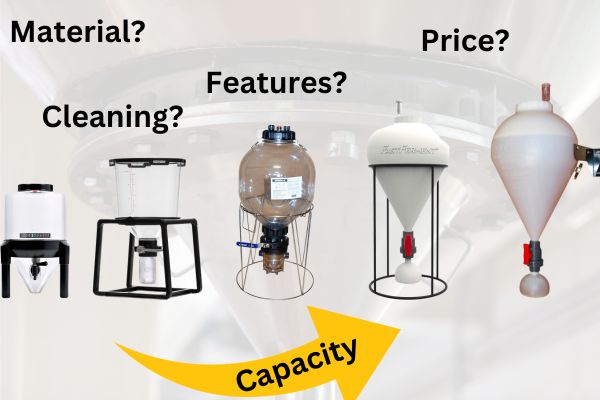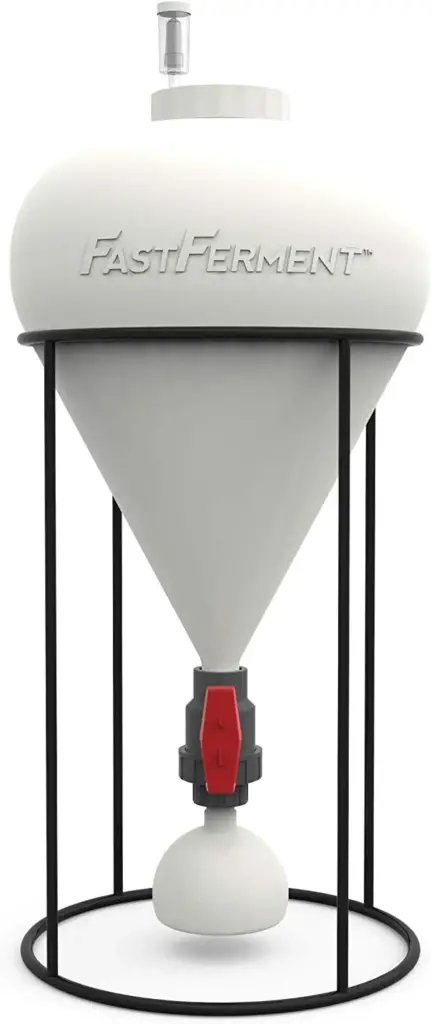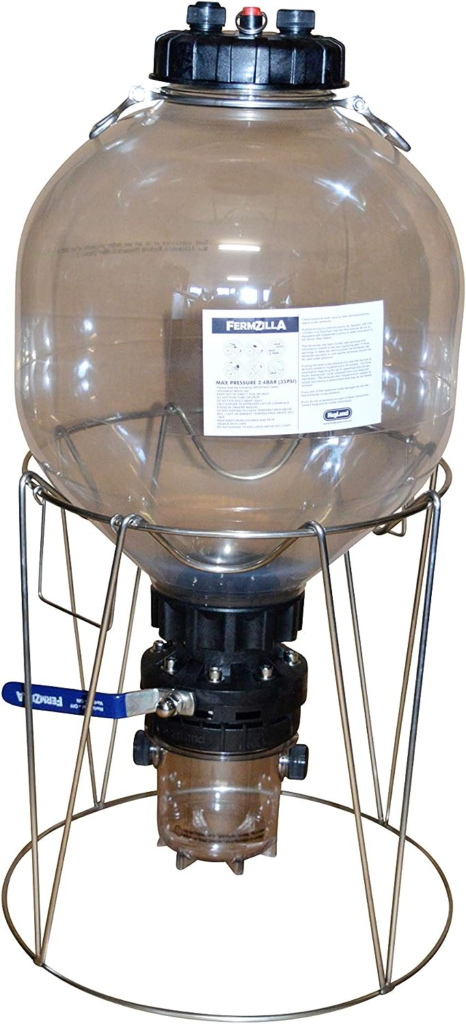Introduction to Conical Fermenters
If you are a passionate home brewer, you might have come across the term “conical fermenters.” But what exactly are they, and why are they gaining popularity among home brewers? Let’s dive in and explore the world of conical fermenters.
What are Conical Fermenters?
Conical fermenters are specialized containers used in the brewing process to ferment and condition beer or other fermented beverages. Unlike traditional fermenters, conical fermenters have a unique cone-shaped bottom.
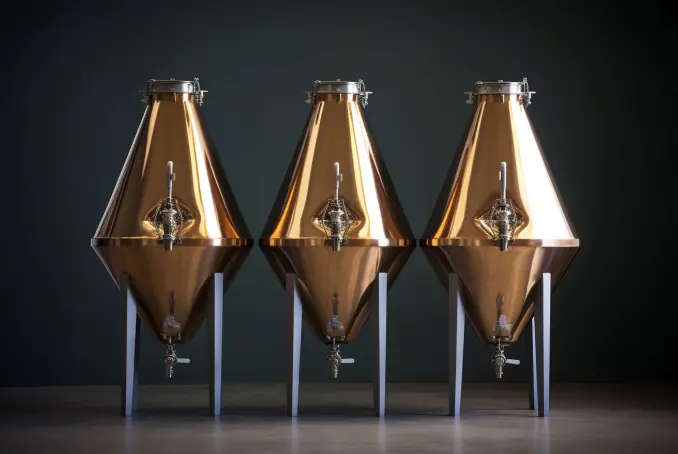
This design allows the sediment, or trub, to settle at the bottom of the vessel, making it easier to remove later. Most conical fermenters also come with a built-in valve or racking arm for convenient transfer of the beer into secondary containers.
Benefits of Using Conical Fermenters
Using a conical fermenter offers several advantages over traditional fermenting methods:
- Easier yeast harvesting: With a conical fermenter, you can easily collect and reuse yeast. The settled yeast can be separated from the beer while it is still in the fermenter, minimizing contamination risks.
- Improved clarity and flavor: The conical shape allows the trub to settle at the bottom, preventing it from re-entering the beer during racking. This results in clearer beer with enhanced flavors.
- Efficient temperature control: Many conical fermenters come with temperature control options, such as built-in cooling or heating systems. Maintaining the ideal temperature throughout the fermentation process is crucial in producing high-quality beer.
Benefits for Homebrewers
Conical fermenters play a vital role in the home brewing process, allowing home brewers to take their craft to the next level.
They provide better control over fermentation, resulting in consistent and professional-quality beer. Moreover, the ease of cleaning and the ability to harvest and reuse yeast make conical fermenters a valuable investment for dedicated home brewers.
In conclusion, if you are serious about home brewing and want to elevate the quality of your beer, a conical fermenter is worth considering. Its unique design and numerous benefits make it an essential tool in the arsenal of any passionate home brewer. Cheers to better brews! [1][2][3][4][5][6]
Top Brands of Conical Fermenters
FastFerment
FastFerment is a popular brand among homebrewers. Their conical fermenters are designed to simplify the fermentation process and produce high-quality results.
FastFerment Conical Fermenter
These fermenters come with a variety of features that make brewing easier, such as an integrated thermowell for temperature monitoring, a bottom valve for easy yeast and trub removal, and a wall-mounting system for space-saving convenience.
Kegland (FermZilla)
Kegland, known for their innovative brewing products, offers the FermZilla conical fermenters. These fermenters are made from high-quality materials that are resistant to oxygen permeation and easy to clean.
FermZilla 27L Conical Fermenter
The FermZilla features a pressure-rated lid and a collection ball for harvesting yeast and for closed system transfers. They also have options for both stainless steel and plastic fermenters to suit the preferences of different homebrewers.
BrewDemon
BrewDemon offers conical fermenters that are perfect for the beginner homebrewer. Their fermenters are compact, lightweight, and easy to use. The BrewDemon conical fermenters come with a wide-mouth lid for hassle-free cleaning, a spigot for convenient bottling, and an airlock for proper fermentation. They are also made from durable and food-grade materials to ensure the safety and quality of your brew.
BrewDemon Hard Cider Kit
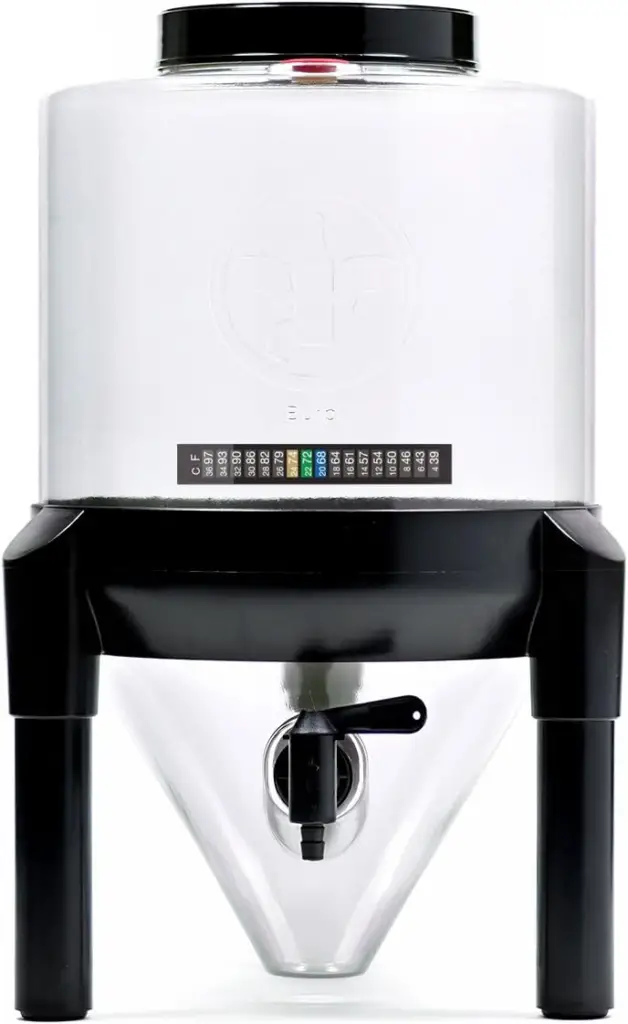
Experience CONICAL Cider Brewing on a Budget!
Introducing the BrewDemon Hard Cider Kit, your gateway to crafting exceptional hard cider at home.
- Revolutionary conical fermenter design for sediment-free brewing
- Efficient 2-gallon recipes for consistently exceptional results
- Premium New Zealand recipe for a dry, crisp, and refreshing taste
- Quick 15-minute cider brewing on the stove, allowing for personalization
- Scratch-resistant fermenter material for durability
- Compatible with a variety of sanitizers for your convenience
When choosing a conical fermenter for your home brewing setup, it is important to consider factors such as capacity, material quality, ease of use, and additional features. These top brands of conical fermenters offer a range of options to suit different brewing needs and budgets. Investing in a high-quality fermenter can greatly improve the fermentation process and help you achieve consistent and flavorful results in your homebrews. [7][8][9][10][11][12]
Types of Conical Fermenters
Looking to take your home brewing to the next level? Consider investing in a conical fermenter. These specialized vessels not only enhance the fermentation process but also simplify the brewing experience. In this article, we will explore the two main types of conical fermenters: plastic and stainless steel, and discuss their pros and cons.
Plastic Conical Fermenters
Plastic conical fermenters are a popular choice among beginner and intermediate home brewers. They are affordable, lightweight, and easy to clean. Plastic fermenters often feature a transparent design, which allows brewers to easily monitor the fermentation process without exposing the beer to oxygen.
Additionally, they are often equipped with airlocks and sampling ports, making it easy to take gravity readings or transfer beer.
However, plastic fermenters may not be suitable for long-term aging or high-temperature fermentations. They have a lower thermal conductivity, which means they may not provide the same level of temperature control as stainless steel fermenters. Furthermore, plastic is more prone to scratches, which can harbor bacteria and affect the overall quality of the beer.
Stainless Steel Conical Fermenters
Stainless steel conical fermenters are the go-to choice for professional brewers and serious home brewing enthusiasts. They offer superior durability, temperature control, and resistance to scratching and bacteria growth.
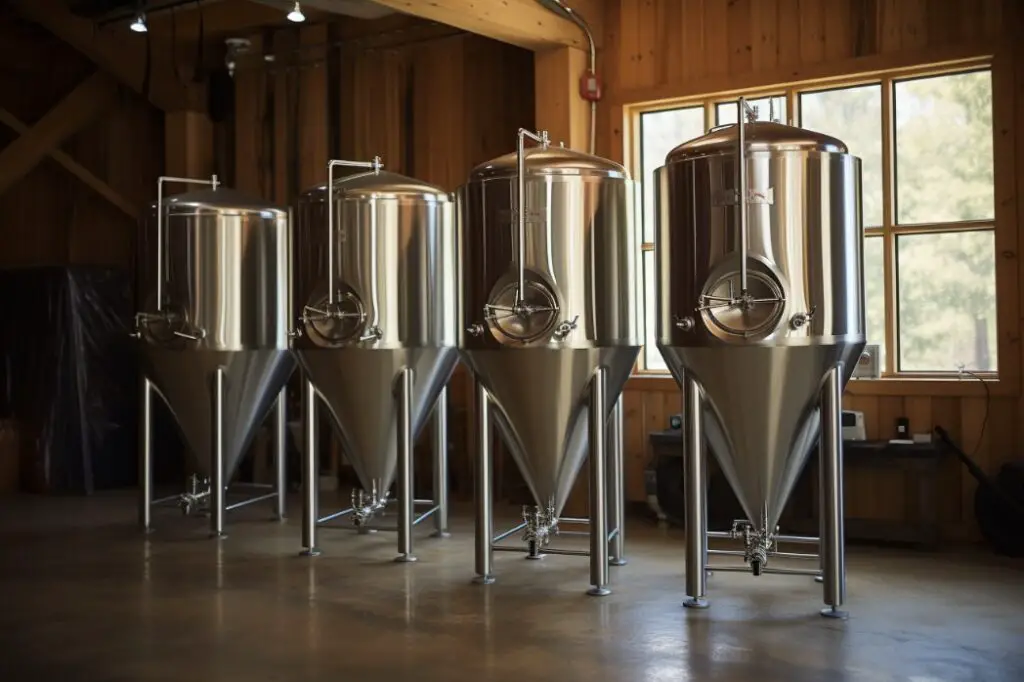
Stainless steel vessels are also more effective at preventing oxidation, which can negatively impact the taste and aroma of the beer. Moreover, they are compatible with accessories like cooling coils, thermowells, and pressure gauges, allowing for more advanced brewing techniques.
However, stainless steel fermenters tend to be more expensive compared to their plastic counterparts. They are also heavier and require more effort to clean. Additionally, the opaque design of stainless steel fermenters may limit visibility during the fermentation process, requiring the use of additional equipment to monitor progress.
Pros and Cons of Each Type
Here’s a summary of the pros and cons of each type of conical fermenter:
| Type | Pros | Cons |
|---|---|---|
| Plastic Conical Fermenters | – Affordable and lightweight – Easy to clean – Transparent design for easy monitoring – Equipped with airlocks and sampling ports | – Not suitable for long-term aging or high-temperature fermentations – Prone to scratches |
| Stainless Steel Fermenters | – Durable and resistant to scratching and bacteria growth – Better temperature control and oxidation prevention – Compatible with accessories | – More expensive – Heavier and harder to clean – Opaque design limits visibility |
In conclusion, both plastic and stainless steel conical fermenters have their advantages and disadvantages. The choice ultimately depends on your brewing goals, budget, and personal preferences. Whichever option you choose, investing in a conical fermenter can greatly enhance the quality and consistency of your home brews. [13][14][15][16][17][18]
Features to Consider in Conical Fermenters
If you are an avid home brewer, you know just how important it is to have the right equipment to create the perfect batch of beer. One essential piece of equipment that every serious home brewer should consider is a conical fermenter. These specialized containers offer several advantages over traditional fermenters and can greatly improve the quality of your brews. Here are three key features to consider when choosing a conical fermenter for your home brewing needs.
Domed Stainless Steel Lids
A conical fermenter with a domed stainless steel lid is a great choice for several reasons. First, the dome shape allows for better carbon dioxide release during fermentation. This helps prevent off-flavors and improves the overall taste of your beer. Additionally, stainless steel is easy to clean and sanitize, ensuring that your fermenter remains free from any unwanted contaminants.
Convenient Racking Ports
Racking ports are openings in the conical fermenter that allow for easy transfer of the beer from one vessel to another. Look for a fermenter that offers multiple racking ports at different heights. This allows you to easily separate the beer from the sediment, resulting in clearer, cleaner brews. The ability to transfer the beer without disturbing the sediment also reduces the risk of oxidation and contamination.
Leg Extensions and Casters
Having a conical fermenter with leg extensions and casters is a game-changer for home brewers. These features make it easy to move and transport the fermenter, allowing for greater flexibility and convenience. Whether you need to move your fermenter to a different location or simply want to clean the area underneath, the ability to easily roll the fermenter around is a huge advantage.
In conclusion, investing in a conical fermenter with features such as a domed stainless steel lid, convenient racking ports, and leg extensions with casters can greatly enhance your home brewing experience. By ensuring better fermentation, easy transfer of beer, and improved mobility, you’ll be well on your way to creating exceptional brews that will impress even the most discerning beer enthusiasts. Cheers! [19][20][21][22][23][24]
Choosing the Right Size of Conical Fermenter
For avid home brewers, the journey towards perfecting the craft of brewing beer often leads to using conical fermenters. These specialized vessels offer several advantages over traditional fermentation methods, such as better temperature control, easier yeast harvesting, and reduced chance of contamination. However, selecting the right size of conical fermenter is crucial to ensure successful brewing outcomes.
Sub 10-Gallon Options
For home brewers who produce smaller batches, conical fermenters with a capacity of less than 10 gallons are ideal. These compact options provide excellent control and precision for experimental brews, allowing for more frequent batches and recipe variations. They are also easier to clean and maintain. Additionally, for those with limited space, the smaller size ensures a perfect fit in your brewing area.
Larger Options (27-Gallon and Above)
If you are a seasoned home brewer or planning to scale up your operations, larger conical fermenters with a capacity of 27 gallons or more are worth considering. These fermenters are suitable for brewing larger batches and offer more flexibility for advanced brewing techniques, such as cold crashing and aging. They are also commonly used in small commercial breweries.
Matching Fermenters to Your Brewing Needs
When selecting a conical fermenter, it’s essential to consider your brewing needs and goals. Factors such as batch size, frequency of brewing, space availability, and long-term aspirations all play a crucial role in determining the right size for your conical fermenter.
It’s worth noting that investing in a slightly larger fermenter than your current needs allow room for growth and experimentation in the future.
In conclusion, choosing the right size conical fermenter is vital to ensure a successful brewing experience. Whether you opt for a sub 10-gallon fermenter or a larger option, consider your specific brewing needs and future aspirations to make an informed decision. With the right size fermenter, you’ll be well on your way to brewing exceptional beers at home. [25][26][27][28][29][30]
Maintenance and Cleaning of Conical Fermenters
For home brewers, maintaining and cleaning conical fermenters is essential for achieving consistent and high-quality brews. Here are some key points to keep in mind when it comes to the upkeep of your fermenter.
Proper Sanitization Process
To prevent contamination and off-flavors in your beer, it’s crucial to follow a thorough sanitization process for your conical fermenter. Start by disassembling any removable parts and soaking them in a sanitizing solution. Clean the interior of the fermenter using a non-abrasive brush and a mild detergent. Rinse thoroughly to remove any traces of detergent before sanitizing. Utilize a no-rinse sanitizing agent to ensure all surfaces are properly sanitized. Remember to also sanitize any tools or equipment used during the cleaning process.
Removing Trub and Yeast
After each fermentation cycle, it’s important to remove the trub and yeast that settle at the bottom of the conical fermenter. This can be done by draining the fermenter through the bottom valve and discarding the sediment. For more thorough cleaning, use a soft cloth or sponge to wipe away any remaining residue inside the fermenter. Avoid using abrasive materials that could scratch the surfaces. It’s recommended to perform regular cleaning sessions to maintain optimal performance.
Long-term Durability and Performance
To ensure the long-term durability and performance of your conical fermenter, it’s essential to handle it with care. Avoid dropping or mishandling the fermenter to prevent any damage. Store it in a clean and dry location to avoid exposure to moisture or contaminants. Regularly inspect the seals and gaskets to ensure they are intact and working effectively. Follow the manufacturer’s guidelines for recommended maintenance practices and intervals.
By following proper maintenance and cleaning procedures, you can extend the lifespan of your conical fermenter and continue to enjoy brewing delicious and consistent batches of beer. [31][32][33][34][35][36]
Conclusion
For home brewing enthusiasts, finding the right equipment can make all the difference in the quality of their beer. One popular option that many brewers swear by is a conical fermenter. This specialized vessel offers several advantages over traditional fermenting methods, making it a prime choice for serious home brewers.
Advantages of Using Conical Fermenters in Home Brewing
- Improved Fermentation: Conical fermenters are designed to allow for better yeast sedimentation and separation. The conical shape facilitates the easy collection of sediment at the bottom, reducing the risk of off-flavors and producing a cleaner, clearer final product.
- Easy Sampling and Transferring: Conical fermenters typically come with sampling valves and transfer ports, making it a breeze to take small samples during fermentation or move the beer to secondary vessels for aging or dry hopping. This eliminates the need for siphoning, reducing the risk of contamination and making the process more efficient.
- Temperature Control: Many conical fermenters are equipped with built-in temperature control features, such as a jacket for temperature regulation or the ability to connect to a temperature control system. This allows brewers to maintain optimal fermentation temperatures, leading to better flavor development and consistent results.
Final Tips for a Successful Brewing Experience
- Sanitation: Ensure that your conical fermenter, as well as all other brewing equipment, is thoroughly cleaned and sanitized before each use to avoid any contamination that could spoil your beer.
- Monitoring: Regularly monitor the fermentation process by taking gravity readings and tasting samples to ensure everything is progressing as it should. This allows you to make any necessary adjustments along the way.
- Patience: Brewing beer is a waiting game, and using a conical fermenter doesn’t eliminate the need for patience. Allow your beer sufficient time to ferment and condition, as rushing the process can lead to subpar results.
In conclusion, using a conical fermenter can greatly enhance the home brewing experience. With improved fermentation, easy sampling and transferring, and temperature control capabilities, home brewers can achieve higher quality beers with greater consistency.
By following proper sanitation practices, monitoring the fermentation process, and practicing patience, brewers can maximize their chances of success and enjoy their craft even more.

